Dark Heart Read online
Page 4
A rifle fired nearby, two shots. Richard instinctively hunched down over the patient. His hands shook as he tried to unzip his bag, his latex-coated fingers slick with blood. He pulled out a syringe of morphine and injected it into the man’s arm. Taking out another dressing, he bit off the end of the package with his teeth, unwrapped it and then laid the waterproof cover over the wound. The suction from the man’s punctured lung drew the wrapper over the bullet hole, sealing it, but Richard knew that the lung could continue to leak air into the chest cavity, causing a tension pneumothorax, which could kill the ranger in a matter of minutes. He pulled a fresh rubber glove from his bag and used his surgical scissors to snip off a finger, then took an IV needle from its sterile wrapper and slid it through the tip of the latex sheath. He plunged the needle through the dressing wrapper and into the man’s lung cavity and lowered his head to the improvised one-way valve. He heard the hiss of air through the open end of the finger that told him the lung was now venting outside the man’s chest. Next he took out his scissors and cut the man’s camouflaged shirt sleeve lengthways, then inserted an IV into a vein in his arm.
A rifle was firing on automatic and a three-round burst cracked around Richard, showering him and his patient with shredded leaves and twigs from the tree above them. Richard threw himself across the wounded ranger. ‘Bloody hell!’
The patrol member who’d greeted him was firing back now, yelling to his comrades. Richard heard the helicopter’s engine change note. When he looked over he saw the pilot waving to him, urging him to get a move on. ‘Help me get him on board,’ Richard yelled.
The man nearest him slung his FN rifle across his body and moved to the wounded man’s feet. On three they lifted him, Richard carrying him under the arms and the other man holding his ankles. Despite the morphine the man screamed in agony. They took him to the helicopter and slid him through the rear door, laying him on the floor. Richard climbed in after him. ‘Will you be all right?’ he yelled back to the ranger over the noise.
‘Ja. Reinforcements are coming, and that poacher he is running away now. You go.’
Richard nodded and closed the door. Andre lifted off and Richard arranged himself so he could monitor the patient. As he hooked the IV to a fire extinguisher on the fuselage wall, his foot knocked against something loose. It was a pistol. There was an empty holster on the man’s belt. He unzipped his medical pack and slid the weapon in. He didn’t want it getting lost or stolen at the hospital and he’d take it back to the investigations office the next day.
Richard found a set of headphones and heard the pilot radioing the Mediclinic at Nelspruit, advising them they were inbound with a seriously injured patient who’d suffered a gunshot wound to the chest. The man looked up at Richard, blinking. There was fear in his eyes. Richard took the injured ranger’s hand in his and gripped it, as much to reassure himself as the patient, and to still the shaking. He needed a drink and a smoke, maybe more. No, he told himself. Not that.
He closed his eyes and the waking nightmare began. The sound of gunfire, the sight of red blood on black skin, the man’s scream as they’d lifted him into the chopper – these things brought it all back. It was always there, of course, lurking at the dark edges of his consciousness, but now it swamped him. The bodies were rising up, walking towards him, threatening to smother him. He held the wounded ranger’s hand so hard he thought he might break the poor man’s bones. With his other hand he cuffed away the tears that started to well.
‘You OK back there, Doc?’ Andre asked in the headphones. Richard nodded, keeping his eyes closed so the younger man wouldn’t see. ‘How’s our man doing?’
Richard opened his eyes to look down at him. He forced a smile for the wounded man’s sake. ‘I don’t know.’
That silenced the pilot. Below them, the darkness of the national park bush gave way to the lamps and cooking fires that dotted the hills of the sprawling informal settlements outside Numbi Gate. They passed over pine plantations and soon the brighter lights of White River and, finally, the provincial capital of Nelspruit, lately renamed Mbombela, came into view. ‘Hang in there,’ he whispered to the patient and himself.
A trauma team was waiting at the helipad, and as they eased the ranger onto a gurney Richard briefed the surgeon on the drugs and treatment he’d administered. When the man was wheeled away there was nothing else for him and the pilot to do, so they got back in the helicopter and took off again. They flew back to the Skukuza airport, which had once accepted daily South African Airways commercial flights but was now restricted to charters and national parks take-offs and landings. Andre drove Richard back to Ten Minutes to collect his vehicle.
‘Hectic night hey, Doc?’
‘Yes.’ He said goodbye to the pilot and drove back to the staff village. On the way he gulped the open, flat beer sitting in the beverage holder. He was going to need a lot to drink before he’d be able to get to sleep.
Oddly, when he arrived back at his home in Impala Street, the lights were on. As he turned into the driveway he saw a vehicle there. It was Janine’s. He never locked his house – it was safe in the staff village – and she must have let herself in.
‘Shit.’
She opened his front door as he got out of the Discovery and grabbed his bag. ‘I’m sorry . . .’ She met him on the pathway.
‘What are you doing here, Janine?’ Then, when she turned her head, he saw the swollen eye and the beginnings of a bruise. ‘Lourens?’
‘He didn’t hit me, if that’s what you think. He never has, but I’ve never seen him like he was tonight. He only came home once the Mediclinic people told him his man was alive and stable. He cares more for them than he does his family.’
Richard ran a hand through his hair. ‘What happened?’
‘He sent the kids to their room then pulled his gun out. He didn’t point it at me, but I was scared. I had to get out of the house. I tripped when I ran outside and hit my head on the pavement. Richard . . . he said he’s going to kill you. I told him nothing had happened, that we hadn’t . . . you know.’ She put a finger to her puffy eye and started to cry. Richard took her hand and led her inside.
He flicked the lights off and told Janine to sit on the couch. He went to the fridge and stared at the beers sitting there, tempting him, but grabbed a jug of water instead. He poured two glasses and took one to her. ‘Do you have someone to stay with . . . a friend, a relative?’
She took the dewy glass in both hands. ‘All my family’s in PE.’
Port Elizabeth was at the other end of the country. He realised that in the closed community of the staff village word would soon get around about what had happened. Bloody Helen had probably told half the women already. Richard knew the best thing he could do was pack his few bags, throw them in the Discovery and leave in the dead of night. It wouldn’t be the first time he’d left a job that way. But what about Janine?
‘I can’t leave my kids,’ she said. ‘And he’d kill us all if I tried to take them with me. What am I going to do?’
‘Give him the night. I’m sure he’ll calm down.’
‘I hope you’re right, Richard. Can I stay here?’
He didn’t want her in his home, but he had no choice. ‘The bed in the spare room’s made up.’ She nodded. Taking the empty glass from her hand as she stood, he couldn’t help reaching out to gingerly touch the swelling. ‘I’ll get you some frozen peas for that.’
She reached up and wrapped her hand around his. ‘Thank you. I’m sorry for all of this.’
‘Two to tango, and all that.’ Gently, he lowered her hand. ‘Tell you what, I’ll run you a bath and make a cup of tea, all right?’
‘You really are a friend, you know that? I think we should have left it at that, but I don’t regret any of it.’
He nodded. He showed her to the spare bedroom and turned on the taps in the bathroom’s shower. ‘I’ll be in the kitchen.’
Richard left her and went to the lounge room. His medical bag was on th
e dining table, where he’d dumped it. He unzipped the bag and took out the ranger’s pistol. Easing the slide back, he saw there was a round already chambered. He moved the slide forward again and stuffed the pistol into the waistband of his trousers and went to the kitchen.
While the kettle was heating on the gas range he went back to the lounge and opened the curtains across the window that overlooked his front yard and Impala Street. He saw headlights further up the road, though he couldn’t make out the vehicle. As he watched the car he saw the lights go out and heard the engine stop. The vehicle kept coasting along, though, past the house two doors up. When it was outside the senior ranger’s home next door, it stopped. A man got out, and although it was too dark to identify him, there was no mistaking the curved magazine of the AK-47 he held by his side. However, the silhouette of the Russian assault rifle was too long. It looked like there was a silencer screwed to the end. Richard had heard that the business of rhino poaching was becoming more and more sophisticated, and it had been Lourens himself, over drinks at a braai, who had told the assembled menfolk that the investigations division had recently shot dead a poacher armed with a silenced Russian military special forces weapon.
Richard pulled out the pistol he’d taken from the injured ranger and moved back to the bathroom. ‘Janine,’ he hissed. There was no answer, and he realised she couldn’t hear him over the noise of running water. If he alerted her she might come out with a towel wrapped around her. That might tip Lourens over the edge – if he wasn’t already on the other side of sanity.
‘Fuck, fuck, fuck,’ he cursed to himself.
Richard crept back through his house, the pistol up and ready, the fingers of his left hand wrapped around the right, steadying it as much as he could. He stopped at the window again. The man was walking up the driveway, the rifle still held by his side.
Richard moved to the front door and, with his back against the brickwork, opened it a few inches. He peeked around and looked through the crack. ‘Lourens. We need to talk.’
He saw the rifle come up and heard the phut, phut, phut of the silenced rounds leaving the barrel. The wooden door splintered beside him as he pulled his head out of the way, and the lead slugs ricocheted off the kitchen wall inside. ‘Lourens, no!’
Richard glanced back through the window and saw the man running across the lawn, rifle up and taking aim.
‘Richard?’ Janine called. The lounge room was suddenly partially illuminated by light from the bathroom as Janine opened the door.
‘Get back.’
The window shattered and Richard dropped to one knee, pushed his hand past a jagged shard of glass and fired two shots, point-blank into the gunman’s chest.
‘No!’ Janine screamed.
Richard stood. He advanced through the remains of the window, smashing the last of the glass out of the frame into the garden. He kept the pistol out in front of him. The man lay face down in the grass and his assault rifle was a foot away from him, where he’d dropped it. He wore black leather gloves and a black jacket and jeans. Lourens hadn’t been dressed like that.
Richard used his foot to roll the man over. It wasn’t Lourens.
3
It was late January, not October, but as the Berlin Pub was – as its name suggested – German-themed, its owners didn’t need much of an excuse to throw an Oktoberfest weekend party, starting on a Friday night. The place was packed and it was, Liesl thought, to use an overused but in this case accurate South African term, hectic.
Instead of a band there was a blond-haired guy in his twenties singing Afrikaans rock and pop to backing tracks he selected from a laptop. The guy was basically singing karaoke, but he had a good voice and the crowd loved it. Liesl guessed many of the patrons had finished work early on the last day of the working week and had been partying since the afternoon.
Sannette squeezed past a stressed-looking waitress and waved to a bunch of people sitting and standing around an outdoor table. A couple of them were dancing.
‘Howzit, doll,’ said a short guy with a grey crew cut. He kissed Sannette and looked at Liesl.
‘Howzit, I’m –’
‘I know who you are, Liesl Nel, but the question is, do you remember me?’
She didn’t but that wasn’t unusual. She met so many people in her line of work, and she’d never been good at remembering faces. People knew her from her by-line and now that she had moved back to South Africa full-time she’d been in this situation more than once. ‘Ummm . . .’
‘Piet . . . Piet du Toit. From high school in Letsitele.’
‘Oh . . . Piet, of course. You’re a long way from home. You haven’t changed a bit.’
He laughed. She really didn’t remember him at all. ‘Hey, can we get some drinks over here,’ Piet called to the harried waitress. ‘What’ll it be?’
‘White wine, please.’ Sannette said she’d have the same. Piet ordered a bottle of Two Oceans sauvignon blanc, a glass of ice and a brandy and Coke.
Sannette said, ‘Everyone, this is Liesl Nel, the famous journalist from Escape! magazine. She and Piet and I were all at school together out in the wilds of Limpopo province, where we grew up. Liesl, this is everyone.’
Liesl waggled her fingers at the crowd of laughing, half-drunk people at the table. Piet had returned his attention to her and taken a step closer. She backed up, but was blocked by a tree. The pub was set in an old house and spilled out down the slope of what would have been the back yard. There were people everywhere. Liesl felt her cheeks start to warm up, and she wiped beads of perspiration from her top lip.
‘Hot tonight, hey?’ Piet said.
‘Ja,’ she said, but she knew it wasn’t the heat.
‘I love Escape! and I’m a big fan of your writing and your photos,’ he said, gazing at her. The drinks came and Liesl was moistening her lips with her tongue in anticipation as Piet poured the wine and added a handful of ice cubes. He looked up and she hoped he couldn’t see how desperate she was for the drink. Liesl took two big gulps.
‘Thanks,’ she said.
‘You must have the best job in the world, hey, travelling all over Africa, getting to try out fancy new four-by-fours, staying in all those luxury safari lodges. Hell, what a life.’
‘It’s not all it’s cracked up to be,’ she said.
Piet raised his eyebrows. ‘Really?’
‘No. I’m joking, it is the best job in the world.’
He laughed and topped up her glass. She didn’t stop him. She’d had two gin and tonics at Sannette’s and was just getting started. In fact, there was a high turnover of staff at Escape! magazine. It did seem like a fun job, and it was for a while, but spending eight months of every year on the road flying and driving from one part of the continent to the other played havoc with relationships.
‘How long have you been at Escape! now?’
‘A year this time around, but I was there for a couple of years from 2000 onwards.’
Piet nodded, sipping his brandy and Coke. ‘Ja, I won’t say I’ve been stalking you, but I have followed your career off and on over the years. I mean, you were like the most famous person to come out of our school.’
‘Oh, I don’t know about that . . .’
‘Ja, no, it’s true, hey. I sell insurance, Sannette runs a dress shop.’
‘Hey, exclusive boutique,’ Sannette interjected. Liesl hoped she might save her from Piet, or introduce her to someone else. He was a nice enough guy, but she knew where this conversation was headed and she wasn’t in the mood tonight. All she wanted to do was gulp down her drink, get out of here and go back to Sannette’s and open another bottle by herself.
‘And then there was you, making the front page of nearly every newspaper in the world with those pictures you took in Rwanda when all those blacks went crazy and chopped each other into little pieces, back in, what . . .’
‘In 1994 and 1995.’
‘And then Afghanistan. You were wounded in that car bomb, but you kept on taking pi
ctures. Absolutely –’
‘And what have you been up to since school, Piet? You said insurance, yes?’ She took a deep breath. The guy was only trying to be flattering, and she should be used to it, but he was crowding her – everyone in the place was crowding her. The last thing she wanted to discuss was her photographs. She glanced across at Sannette, hoping for a way out; although her friend was deep in conversation with another woman she must have been keeping an eye on Liesl and Piet, because she caught the look and simply smiled and winked.
Oh my God, Liesl thought, as Piet reeled off his career milestones, she’s trying to set me up. Liesl would be forty in two months’ time and although she told her few close friends that she was perfectly happy without a relationship, they’d all at one time or another tried to set her up with someone. Elise had even tried to set her up with another woman, despite the fact that Liesl was not that way inclined. She could, and did, find a man whenever she needed one. Piet turned back to the table to take the wine bottle from the ice bucket and Liesl caught Sannette’s eye again. Liesl didn’t need this man, though. ‘I am going to kill you,’ she mouthed. Sannette grinned and winked again.
‘So, where are you off to next?’ Piet asked, refilling her glass.
‘I’m driving up to Livingstone via Botswana, taking one of the new BMW four-by-fours for a spin.’
‘What a pleasure,’ Piet said. ‘I’m off to a conference at Sun City – that’s about as exciting as my job gets.’
She looked at his left hand. ‘You’re not married?’ She didn’t think Sannette would pimp her to an attached guy.
He looked away from her for a second. ‘Was. My wife died of breast cancer. I’ve got two girls, thirteen and ten. They’re great, but a bit of a handful.’
‘I’m so sorry, Piet.’ And she was. She saw how he’d sagged a little in the telling of his story. It was the same with her. They said it was good to confront and unburden, but when you had to tell the same tale again and again, it was as though another little piece of you just died. If you said these things too many times, one day there would be nothing left. She put a hand on his arm. ‘Really sorry.’

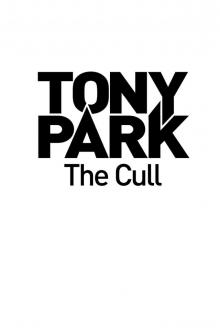 The Cull
The Cull Blood Trail
Blood Trail Red Earth
Red Earth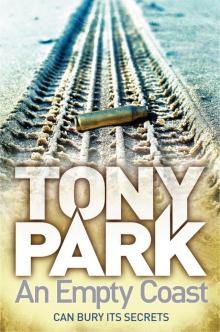 An Empty Coast
An Empty Coast Dark Heart
Dark Heart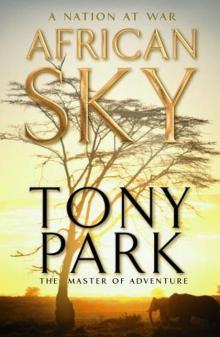 African Sky
African Sky The Delta
The Delta Captive
Captive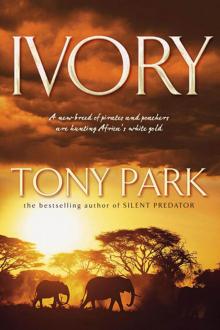 Ivory
Ivory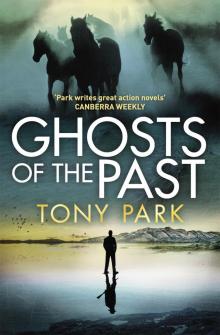 Ghosts of the Past
Ghosts of the Past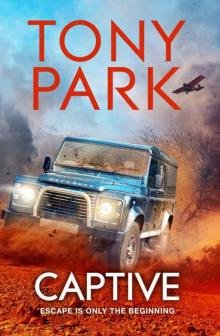 Captive_A High-octane And Gripping African Thriller
Captive_A High-octane And Gripping African Thriller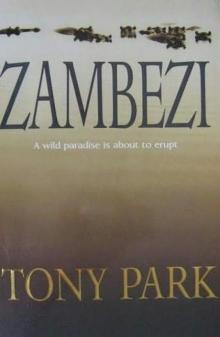 Zambezi
Zambezi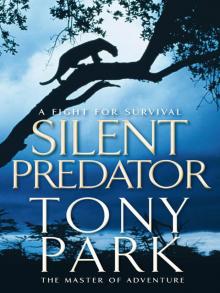 Silent Predator
Silent Predator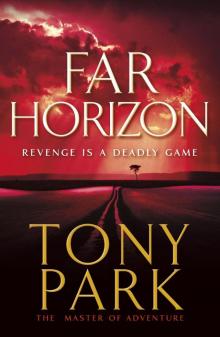 Far Horizon
Far Horizon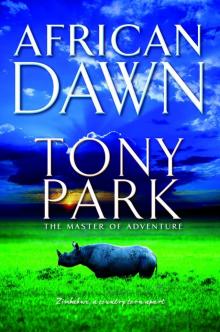 African Dawn
African Dawn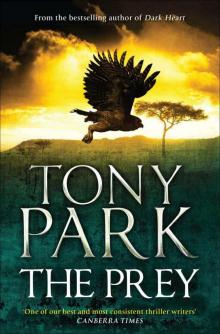 The Prey
The Prey Safari
Safari